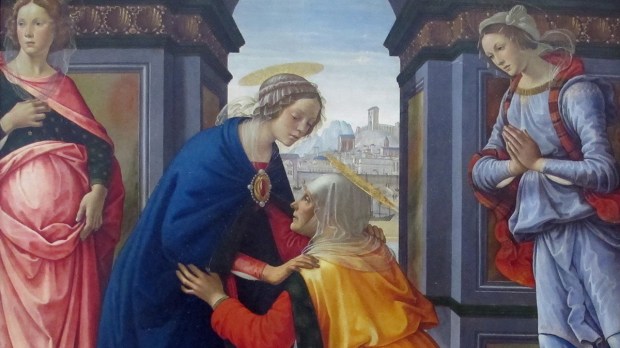How familiar are you with Mary’s Magnificat (Luke 1: 46-55)? Perhaps too familiar? We can recite it from memory, moving on to the next thing. That’s wrong. We should recite haltingly, reluctantly. Why?
Yes, it’s lovely to hear Mary rhapsodize about her joy. (That joy is a two-sided coin—more about that shortly.) What she says in the rest of her hymn urges us to be careful about what we wish for. If we invite the Christ of God into our lives, our world will be overturned, and our lives never the same. Christ isn’t some “thing” we can add to our world and then go about our business; he is no ornament. Christ cannot be our religious mascot that we summon when we need it, and then put it away when we don’t.
3 Overturnings
We find three overturnings in the Magnificat: “He has shown the strength of his arm and has scattered the proud in their conceit” is the first. It rejects pride — the birth mother of all sin. Pride is the original rebel. Pride says, “My will be done! God can’t be God. Something else, someone else, anything else, anyone else may be God, except God himself!” If we welcome Christ, we’ll have to recognize him as king, as sovereign, and that means our pride, our excuses, our idols, will have to be swept away.
The second overturning: “He has cast down the mighty from their thrones and lifted up the lowly.” The first round of bitter fruits from pride is vain ambition — endless efforts to say, “Me first. Me always first.” All that must be broken. Christ comes to us in humility, obscurity, and vulnerability — three things that vain ambition hates. Submitting to Christ means accepting that the “first shall be last, and the last shall be first” (Matthew 20:16).
The third overturning: “He has filled the hungry with good things, and the rich he has sent away empty.” Pride is the root, vain ambition the bitter fruit. Craving is the hangover from eating that fruit. Once we agree to pride, once we agree to grasping, we can’t be satisfied. There’s never enough — we demand more. We cling to this self-made misery! And Mary says, “If you welcome my divine son, all that will be overturned. All the work of human hands, all the man-made kingdoms will have to fall before the one great crown, yield to the one who forever sits on the throne.”
For us, for her
Such overturnings are hard for us because we’re fallen and accommodate our sin. We’re comfortable with our sin and willing to live with idols. For unrepentant sinners the coming of Christ does not bring joy, but crisis.
How different is Mary! “My soul proclaims the greatness of the lord. My spirit rejoices in God my savior … all generations will call me blessed … the Almighty has done great things for me…” Why is it so easy for her to welcome Christ? Because she’s full of grace. Because she’s without sin, has never known the anguish of being separated from God, has never offered incense to idols, has never loved God with a divided heart.
Let’s not be fooled. Yes, Mary has perfect joy because she is the first and eternal tabernacle of the Word. Joy, St. Thomas Aquinas states, is delight in the presence of the beloved. From the moment of his incarnation, she was united with him — her will is aligned with his. Of course, she would be overcome with joy!
Note well: because she loved absolutely, without division, without reservation, her pain and sorrow would be beyond compare, because the hallmark of love is union, and what happens to the beloved happens to the lover. Everything that Christ suffered in this life —all of his tortures and even his death, Mary suffered too. Here is the great paradox of the Christians, we who are sealed with the sign of the cross and no other sign. In this fallen world, before the triumph of the Christ of God is absolutely realized in the fullness of time, love will require suffering. And those who suffer for love will find joy.
Rushing to the useless
Whenever we read the Magnificat inattentively, overlooking all these things because we’re rushing to what’s apparently urgent but not truly important, we forsake saving truths and healing words. I can’t afford to do that any longer. How about you?
In this time of darkness and cold, let’s draw closer to the light. Let’s draw closer to Mary, named by poet John Lynch as a “woman wrapped in silence.” Let’s imitate her who “treasured up all these things and pondered them in her heart” (Luke 2:19). Let’s sit at her feet, listen, and learn from her.
When I write next, I will offer a reflection on family life. Until then, let’s keep each other in prayer.

